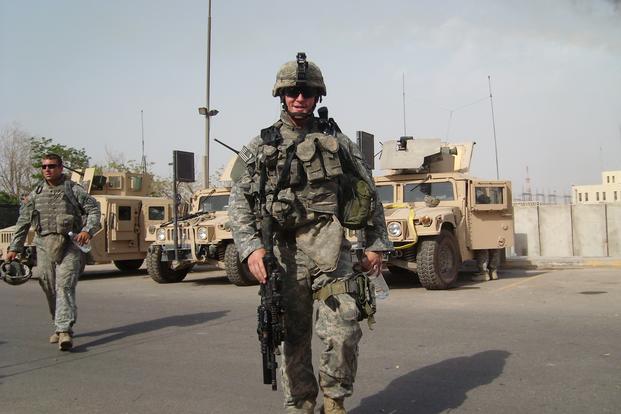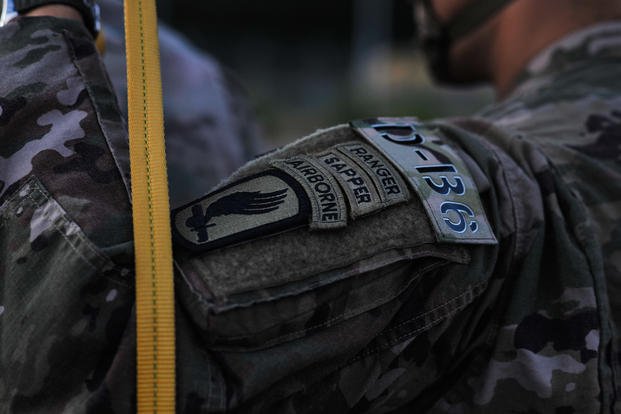It seems a most unlikely story -- a combat Airborne Ranger becomes a cerebral data scientist. But this story perfectly illustrates the single most important lesson every transitioning service member should learn: Your military occupational specialty (MOS) doesn't define your potential.
Like many post 9/11 veterans, Alan Leggitt enlisted because he wanted to make a difference. After witnessing the carnage of war, completing his mission and getting his soldiers home safely, Leggitt wanted a new challenge.
Driven by the desire to help fellow veterans who were wounded in battle, Leggitt went back to school and studied to become a medical researcher, where he learned how to collect and analyze data. His analytical skills, coupled with Army Ranger grit, helped Leggitt excel in the world of data science.
Military.com's Sean Mclain Brown had a conversation with Leggitt about his transition and career as data scientist.
Military.com: Combat Army Ranger to data scientist. How did that happen?
Alan Leggitt: "I know many wounded soldiers. I wanted to use technology to advance the quality of the health care they might receive. Don't laugh; initially I dreamed of building cyborgs, but as a first-generation college student, I wasn't quite sure how to achieve this. I opted to major in physics, because it was one of my favorite subjects from high school.
"Thanks to some amazing mentors, I learned how to program in MATLAB and Python, how to design experiments and test hypotheses, and how to collect and analyze data.
"As I kept in touch with the people I had served with and engaged with other veterans in the San Francisco Bay Area, I began to realize that many veterans, myself included, struggled with mental wounds such as traumatic brain injury, post-traumatic stress, substance abuse, depression, anxiety and/or suicide. I wanted to learn more about how these afflictions manifest in the brain itself.
"While at UCSF [University of California, San Francisco], I realized that while academic institutions provide a stable foundation for scientific research, collaborations with industry can lead to the rapid development of life-changing products that can capture the public imagination. I began to explore my options in the private sector and was eventually offered a job as a data scientist for a seed-stage digital health startup."
Military.com: There's an overwhelming employer demand for data scientists and anyone with strong analytical skills. What's driving that in your opinion?
Alan Leggitt: "I bought my first cell phone at the age of 18 and only used it to make phone calls. Thirteen years later, between my cell phone and laptop, I wouldn't be surprised if I generated a gigabyte of data per day.
"Nearly everything I do -- from browsing the internet, to commuting to work, to taking pictures of my cat -- generates an increasingly large data footprint.
"Companies, governments and nonprofits are looking for people who can use this data to predict behavior, so they can advance causes, sway opinions or develop and sell products."
Military.com: What does it take to be a successful data scientist?
Alan Leggitt:
Curiosity
"Because of the diversity of problems that data scientists tackle, it helps to be able to quickly become interested in a new topic and really want to dig deep into it. Oftentimes, the economic or strategic value of the problem in question isn't immediately apparent, so it helps to fall back on your own intrinsic desire for knowledge for the sake of knowledge. For example, as an undergraduate, I studied the ultrasonic vocalizations of baby mice in order to evaluate genetic models of autism."
Creativity
"Because many of the tools you learn as a data scientist are applicable across a wide variety of problems, it helps to be able to develop creative metaphors to link seemingly unrelated topics. For example, in my current project, I often model arterial blood flow as if it were an electrical circuit. While it may not make sense intuitively, this analogy has proven useful in making predictions.
Attention to detail
"As a data scientist, I write a lot of code. When you make a mistake, the best-case scenario is that it just doesn't work. The worst case scenario is that you think it works, but it spits out poor quality data or results. It's imperative to be able to find mistakes in your own code, as well as your colleagues."
Abstract reasoning
"I've often had to think about problems in more than three dimensions, which is next to impossible to visualize. I've also had to intuit complex nonlinear relationships between variables. It's crucial to be able to develop a complex mental model of your problem space."
Military.com: Are there skills that you were taught in the military that apply to the role of a data scientist?
Alan Leggitt:
Attention to detail
(see above)
Communication
"In the Army, we broke complex problems down into the simplest language possible. As a data scientist, you often need to explain your insights and reasoning to non-technical people. The ability to explain things to a 9-year old is, in my opinion, an extremely underrated skill in the field."
Reproducibility
"I miss being able to grab someone else's rucksack and know exactly where everything is. The military makes everything you do reproducible, which is absolutely crucial in any field of science."
Teamwork
"This one is a no-brainer. The stakes are as high as they get; our lives depend on the team functioning as one unit. In science and in business, especially a startup, to beat your competition, you must work together to the highest order or you will fail."
Data security
"Loose lips sink ships."
Procedural thinking
"The military teaches you to break a problem down into simple actionable steps."
Military.com: What are you working on now?
Alan Leggitt: "The company I work for, Vital Labs, is developing a mobile application that takes a video of your fingertip and uses it to analyze your cardiovascular health. It's consumer focused, and it's meant to empower individuals to make lifestyle changes and use biofeedback to evaluate how those changes are impacting their overall health. This is particularly important for veterans. Veterans are more likely to develop cardiovascular disease than the general population. I'm currently seeking people to beta-test the app and would love to have a cohort of veterans.
"Another group I only recently started volunteering with is called Data for Democracy. They're a network of volunteers who work on publicly available datasets for the sake of social good. This is an excellent community for newcomers to data science. You can get your hands dirty with many different types of data, get mentorship from more senior data scientists and start building your portfolio."
The takeaways:
- Don't let your MOS define your future (unless you want it to).
- Reach out to mentors and the veteran community for informational interviews.
- Use your military training to create an action plan and after-action review.
- Never give up.
Find the Right Veteran Job
Whether you want to polish your resume, find veteran job fairs in your area or connect with employers looking to hire veterans, Military.com can help. Subscribe to Military.com to have job postings, guides and advice, and more delivered directly to your inbox.













